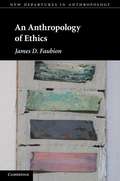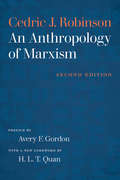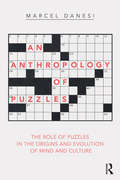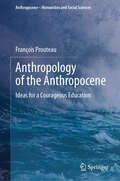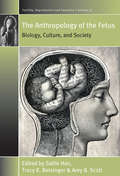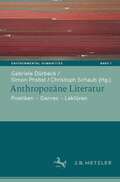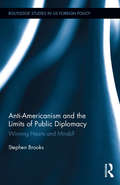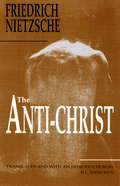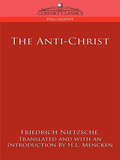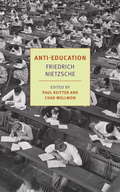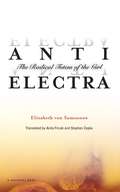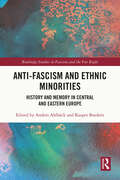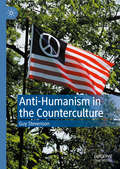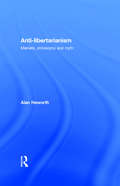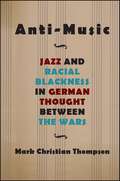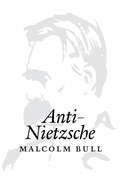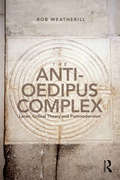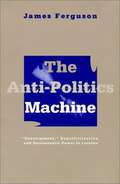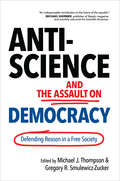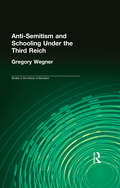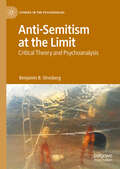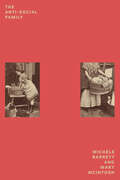- Table View
- List View
An Anthropology of Ethics
by James D. FaubionThrough an ambitious and critical revision of Michel Foucault's investigation of ethics, James Faubion develops an original program of empirical inquiry into the ethical domain. From an anthropological perspective, Faubion argues that Foucault's specification of the analytical parameters of this domain is the most productive point of departure in conceptualizing its distinctive features. He further argues that Foucault's framework is in need of substantial revision to be of genuinely anthropological scope. In making this revision, Faubion illustrates his program with two extended case studies: one of a Portuguese marquis and the other of a dual subject made up of the author and a millenarian prophetess. The result is a conceptual apparatus that is able to accommodate ethical pluralism and yield an account of the limits of ethical variation, providing a novel resolution of the problem of relativism that has haunted anthropological inquiry into ethics since its inception.
The Anthropology of Ignorance
by Casey High Ann H. Kelly Jonathan MairThe question of ignorance occupies a central place in anthropological theory and practice. This volume argues that the concept of ignorance has largely been pursued as the opposite of knowledge or even its obverse. Though they cover wide empirical ground - from clients of a fertility treatment center in New York to families grappling with suicide in Greenland - contributors share a commitment to understanding the concept as a productive, social practice. Ultimately, The Anthropology of Ignorance asks whether an academic commitment to knowledge can be squared with lived significance of ignorance and how taking it seriously might alter anthropological research practices.
An Anthropology of Marxism (Race And Representation Ser.)
by Cedric J. RobinsonAn Anthropology of Marxism offers Cedric Robinson's analysis of the history of communalism that has been claimed by Marx and Marxists. Suggesting that the socialist ideal was embedded both in Western and non-Western civilizations and cultures long before the opening of the modern era and did not begin with or depend on the existence of capitalism, Robinson interrogates the social, cultural, institutional, and historical materials that were the seedbeds for communal modes of living and reimagining society. Ultimately, it pushes back against Marx's vision of a better society as rooted in a Eurocentric society, and cut off from its own precursors. Accompanied by a new foreword by H.L.T. Quan and a preface by Avery Gordon, this invaluable text reimagines the communal ideal from a broader perspective that transcends modernity, industrialization, and capitalism.
An Anthropology of Puzzles: The Role of Puzzles in the Origins and Evolution of Mind and Culture
by Marcel DanesiAn Anthropology of Puzzles argues that the human brain is a "puzzling organ" which allows humans to literally solve their own problems of existence through puzzle format. Noting the presence of puzzles everywhere in everyday life, Marcel Danesi looks at puzzles in society since the dawn of history, showing how their presence has guided large sections of human history, from discoveries in mathematics to disquisitions in philosophy. Danesi examines the cognitive processes that are involved in puzzle making and solving, and connects them to the actual physical manifestations of classic puzzles. Building on a concept of puzzles as based on Jungian archetypes, such as the river crossing image, the path metaphor, and the journey, Danesi suggests this could be one way to understand the public fascination with puzzles. As well as drawing on underlying mental archetypes, the act of solving puzzles also provides an outlet to move beyond biological evolution, and Danesi shows that puzzles could be the product of the same basic neural mechanism that produces language and culture. Finally, Danesi explores how understanding puzzles can be a new way of understanding our human culture.
Anthropology of the Anthropocene: Ideas for a Courageous Education (Anthropocene – Humanities and Social Sciences)
by François ProuteauThis book questions the epistemological foundations of education in the Anthropocene. It reviews a body of evidence that strongly supports the view that the Earth’s systems are emerging into an epoch known as the Anthropocene. This volume examines a number of concepts including the political ecology and the modes of veridiction in the Anthropocene as well as philosophy, anthropology and history of the concept of courage and the humanities. It champions forward-looking educational initiatives and presents a new philosophy on education for the Anthropocene. The concept of the Anthropocene extends to many fields of sciences. It is now anchored in a multidisciplinary scientific literature and recognized by both sides of the ideological and political battle of the 21st century, on which several controversies are grafted in a complex way. It also has a strong anthropological consistency: what kind of humans do we want to become? The author explores how the recognition of the crisis helps to see the history of humanity with unexpected freshness. This work contributes to an epistemological and paradigmatic reflection on the foundations of education in the Anthropocene epoch. The author has seized on the biogeophysical ruptures of the Anthropocene to develop a pedagogical and anthropological reflection in a stimulating and creative way. This volume is of interest to researchers of the Anthropocene, as well as to scholars in ecology, social sciences, pedagogy, and philosophy.
Anthropology of the Brain
by Roger Bartra Gusti GouldIn this unique exploration of the mysteries of the human brain, Roger Bartra shows that consciousness is a phenomenon that occurs not only in the mind but also in an external network, a symbolic system. He argues that the symbolic systems created by humans in art, language, in cooking or in dress, are the key to understanding human consciousness. Placing culture at the centre of his analysis, Bartra brings together findings from anthropology and cognitive science and offers an original vision of the continuity between the brain and its symbolic environment. The book is essential reading for neurologists, cognitive scientists and anthropologists alike.
The Anthropology of the Fetus: Biology, Culture, and Society (Fertility, Reproduction and Sexuality: Social and Cultural Perspectives #37)
by Sallie Han Tracy K. Betsinger Amy B. ScottAs a biological, cultural, and social entity, the human fetus is a multifaceted subject which calls for equally diverse perspectives to fully understand. Anthropology of the Fetus seeks to achieve this by bringing together specialists in biological anthropology, archaeology, and cultural anthropology. Contributors draw on research in prehistoric, historic, and contemporary sites in Europe, Asia, North Africa, and North America to explore the biological and cultural phenomenon of the fetus, raising methodological and theoretical concerns with the ultimate goal of developing a holistic anthropology of the fetus.
Anthropozäne Literatur: Poetiken – Themen – Lektüren (Environmental Humanities #1)
by Gabriele Dürbeck Simon Probst Christoph SchaubDer sich seit 2000 etablierende Anthropozän-Diskurs begreift die Menschheit als geophysikalische Kraft. Wesentliche Strukturmerkmale dieses Diskurses und seiner Narrative sind das Einnehmen einer planetarischen Perspektive auf die globale Umweltkrise, eine tiefenzeitlich konstituierte Historizität, die Annahme unauflösbarer Wechselbeziehungen von Natur und Kultur und das Thematisieren ethischer Verantwortung des Menschen für das Erdsystem. Die literaturwissenschaftliche Forschung hat in den letzten Jahren das Anthropozän als geologisches sowie kulturelles Konzept aufgenommen und spricht zunehmend häufiger von ‚anthropozäner‘ Literatur. Der vorliegende Band mit 15 Beiträgen und einer Einleitung, die das Feld erstmals vermisst, stellt einen innovativen Versuch in der deutschsprachigen Forschungslandschaft dar, Ansätze zusammenzutragen, die die Rede von einer Anthropozän-Literatur in diesem entstehenden Forschungsfeld präzisieren, systematisieren und kritisch befragen. Dabei geht es um mögliche Poetiken und Genres. In Fallstudien (‚Lektüren‘) werden mögliche anthropozäne Lesarten ausprobiert.
Anti-Americanism and the Limits of Public Diplomacy: Winning Hearts and Minds? (Routledge Studies in US Foreign Policy)
by Stephen BrooksContrary to the view held by many who study American foreign policy, public diplomacy has seldom played a decisive role in the achievement of the country's foreign policy objectives. The reasons for this are not that the policies and interventions are ill-conceived or badly executed, although this is sometimes the case. Rather, the factors that limit the effectiveness of public diplomacy lie almost entirely outside the control of American policy-makers. In particular, the resistance of foreign opinion-leaders to ideas and information about American motives and actions that do not square with their pre-conceived notions of the United States and its activities in the world is an enormous and perhaps insurmountable wall that limits the impact of public diplomacy. This book does not conclude that public diplomacy has no place in the repertoire of American foreign policy. Instead, the expectations held for this soft power tool need to be more realistic. Public diplomacy should not be viewed as a substitute for hard power tools that are more likely to be correlated with actual American influence as opposed to the somewhat nebulous concept of American standing.
The Anti-Christ
by H. L. Mencken Friedrich NietzscheThis is Nietzsche's last book and a fitting capstone to his career. It's succinct, biting, and encapsulates the criticisms of Christianity found in his other works. This edition contains an 8,000-word introduction by its translator, the famous iconoclastic writer H. L. Mencken.
The Anti-Christ
by Friedrich Nietzsche"The Christian concept of a god-the god as the patron of the sick, the god as a spinner of cobwebs, the god as a spirit-is one of the most corrupt concepts that has ever been set up in the world... In him nothingness is deified, and the will to nothingness is made holy." See Sharp Press; Tuscon, AZ -from The Anti-Christ. He's one of the most debated thinkers of the 19th century: Nietzsche and his works have been by turns vilified, lauded, and subjected to numerous contradictory interpretations, and yet he remains a figure of profound import, and his works a necessary component of a well-rounded education. The Anti-Christ, first published in German in 1895, is absolutely vital to any meaningful understanding of Nietzsche the man and Nietzsche the philosopher. An insightful and entertaining indictment of Christianity, it has enraged and inspired generations of readers, and this 1920 translation, by H. L. Mencken, considered the best available, is almost as controversial as the work itself, highlighting the darkest side of Mencken's cynicism. Also available from Cosimo Classics: Nietzsche's The Use and Abuse of History.
The Anti-Christ, Ecce Homo, Twilight of the Idols: And Other Writings
by Friedrich NietzscheNietzsche's late works are brilliant and uncompromising, and stand as monuments to his lucidity, rigor, and style. This volume combines, for the first time in English, five of these works: The Antichrist, Ecce Homo, Twilight of the Idols, Nietzsche contra Wagner, and The Case of Wagner. Nietzsche takes on some of his greatest adversaries in these works: traditional religion, contemporary culture, and above all, his one-time hero, Richard Wagner. His writing is simultaneously critical and creative, revealing his alternative philosophical vision, which, after more than a hundred years, still retains its audacious originality.
Anti-Education
by Friedrich Nietzsche Paul Reitter Damion Searls Chad WellmonAN NYRB Classics OriginalIn 1869, at the age of twenty-four, the precociously brilliant Friedrich Nietzsche was appointed to a professorship of classical philology at the University of Basel. He seemed marked for a successful and conventional academic career. Then the philosophy of Schopenhauer and the music of Wagner transformed his ambitions. The genius of such thinkers and makers--the kind of genius that had emerged in ancient Greece--this alone was the touchstone for true understanding. But how was education to serve genius, especially in a modern society marked more and more by an unholy alliance between academic specialization, mass-market journalism, and the militarized state? Something more than sturdy scholarship was called for. A new way of teaching and questioning, a new philosophy . . . What that new way might be was the question Nietzsche broached in five vivid, popular public lectures in Basel in 1872. Anti-Education presents a provocative and timely reckoning with what remains one of the central challenges of the modern world.
Anti-Electra: The Radical Totem of the Girl (Univocal)
by Elisabeth von SamsonowA close examination of the relationship between media, art, and the &“Electra complex&” The feminist counterpart to Deleuze and Guattari&’s Anti-Oedipus, Anti-Electra is a philosophy of &“the girl&” as a model of contemporary transgressive subjectivity. Elisabeth von Samsonow asserts that focusing on the girl&’s escape from the Oedipus complex leads to a fundamental shift in our most common views on media and art.Presenting an interpretation of contemporary technics, Anti-Electra argues that technology today encompasses Electra&’s gadgets and toys. According to von Samsonow, satellite drive technologies such as wireless telephones, WLAN, and GPS echo the &“preoedipal constellation&” that the girl specializes in. And with the help of the girl, the cartography of overlapping zones between humankind and animals, as well as between humankind and apparatuses, is redesigned through what the book holds as a &“radical totemism.&” Anti-Electra ultimately offers a new view on gender, the contemporary world dyed by symbolic girlism, and the (universal) girl in critical dialogue with media, ecology, and society.
Anti-Fascism and Ethnic Minorities: History and Memory in Central and Eastern Europe (Routledge Studies in Fascism and the Far Right)
by Anders Ahlbäck Kasper BraskénAnti-Fascism and Ethnic Minorities explores how, and to what extent, fascist ultranationalism elicited an anti-fascist response among ethnic minority communities in Eastern and Central Europe. The edited volume analyses how identities related to class, ethnicity, gender and political ideologies were negotiated within and between minorities through confrontations with domestic and international fascism. By developing and expanding the study of Jewish anti-fascism and resistance to other minority responses, the book opens the field of anti-fascism studies for a broader comparative approach. The volume is thematically located in Central and Eastern Europe, cutting right across the continent from Finland in the North to Albania in the Southeast. The case studies in the fourteen research chapters are divided into five thematic sections, dealing with the issues of 1) minorities in borderlands and cross-border antifascism, 2) minorities navigating the ideological squeeze between communism and fascism, 3) the role of intellectuals in the defence of minority rights, 4) the anti-fascist resistance against fascist and Nazi occupation during World War II, as well as 5) the conflictual role ascribed to ethnicity in post-war memory politics and commemorations. The editors describe their intersectional approach to the analysis of ethnicity as a crucial category of analysis with regard to anti-fascist histories and memories. The book offers scholars and students valuable historical and comparative perspectives on minority studies, Jewish studies, borderland studies, and memory studies. It will appeal to those with an interest in the history of race and racism, fascism and anti-fascism, and Central and Eastern Europe.
Anti-Humanism in the Counterculture
by Guy StevensonThis book offers a radical new reading of the 1950s and 60s American literary counterculture. Associated nostalgically with freedom of expression, romanticism, humanist ideals and progressive politics, the period was steeped too in opposite ideas – ideas that doubted human perfectibility, spurned the majority for a spiritually elect few, and had their roots in earlier politically reactionary avant-gardes. Through case studies of icons in the counterculture – the controversial sexual revolutionary Henry Miller, Beat Generation writers Jack Kerouac, Allen Ginsberg and William S. Burroughs and self-proclaimed ‘philosopher of hip’, Norman Mailer – Guy Stevenson explores a set of paradoxes at its centre: between romantic optimism and modernist pessimism; between brutal rhetoric and emancipatory desires; and between social egalitarianism and spiritual elitism. Such paradoxes, Stevenson argues, help explain the cultural and political worlds these writers shaped – in their time and beyond.
Anti-libertarianism: Markets, philosophy and myth
by Alan HaworthFree marketeers claim that theirs is the only economic mechanism which respects and furthers human freedom. Socialism, they say, has been thoroughly discredited. Most libertarians treat the state in anything other than its minimal, 'nightwatchman' form as a repressive embodiment of evil. Some reject the state altogether.But is the 'free market idea' a rationally defensible belief? Or do its proponents fail to examine the philosophical roots of their so-called freedom? Anti-libertarianism takes a sceptical look at the conceptual tenets of free market politics. Alan Haworth argues that libertarianism is little more than an unfounded, quasi-religious statement of faith: a market romance. Moreover, libertarianism is exposed as profoundly antithetical to the very freedom which it purports to advance.This controversial book is for anyone interested in the cultural and political impact of free market policies on the modern world. It will be invaluable to students and specialists of political and economic theory, social science and philosophy.
Anti-Music: Jazz and Racial Blackness in German Thought between the Wars (SUNY series, Philosophy and Race)
by Mark Christian ThompsonAnti-Music examines the critical, literary, and political responses to African American jazz music in interwar Germany. During this time, jazz was the subject of overt political debate between left-wing and right-wing interests: for the left, jazz marked the death knell of authoritarian Prussian society; for the right, jazz was complicit as an American import threatening the chaos of modernization and mass politics. This conflict was resolved in the early 1930s as the left abandoned jazz in the face of Nazi victory, having come to see the music in collusion with the totalitarian culture industry. Mark Christian Thompson recounts the story of this intellectual trajectory and describes how jazz came to be associated with repressive, virulently racist fascism in Germany. By examining writings by Hermann Hesse, Bertolt Brecht, T.W. Adorno, and Klaus Mann, and archival photographs and images, Thompson brings together debates in German, African American, and jazz studies, and charts a new path for addressing antiblack racism in cultural criticism and theory.
Anti-Nietzsche
by Malcolm BullNietzsche, the philosopher seemingly opposed to everyone, has met with remarkably little opposition himself. He remains what he wanted to be-- the limit-philosopher of a modernity that never ends. In this provocative, sometimes disturbing book, Bull argues that merely to reject Nietzsche is not to escape his lure. He seduces by appealing to our desire for victory, our creativity, our humanity. Only by 'reading like a loser' and failing to live up to his ideals can we move beyond Nietzsche to a still more radical revaluation of all values--a subhumanism that expands the boundaries of society until we are left with less than nothing in common.Anti-Nietzsche is a subtle and subversive engagement with Nietzsche and his twentieth-century interpreters--Heidegger, Vattimo, Nancy, and Agamben. Written with economy and clarity, it shows how a politics of failure might change what it means to be human.
The Anti-Oedipus Complex: Lacan, Postmodernism and Philosophy
by Rob WeatherillThe Anti-Oedipus Complex critically explores the post ‘68 dramatic developments in Freudo-Lacanian psychoanalysis and cultural theory. Beginning with the decline of patriarchy and the master, exemplified by Freud’s paean for the Father, the revolutionary path was blown wide open by anti-psychiatry, schizoanalysis and radical politics, the complex antimonies of which are traced here in detail with the help of philosophers, such as Nietzsche, Baudrillard, Levinas, Steiner, Žižek, Badiou, Derrida and Girard, as well as theologians, analysts, writers, musicians and film makers. ? In this book, Rob Weatherill, starting from the clinic, considers the end of hierarchies, the loss of the Other, new subjectivities, so-called ‘creative destruction’, the power of negative thinking, revolutionary action, divine violence and new forms of extreme control. The book raises the following questions: Does the engagement of the Radical Orthodoxy movement offer some hope? Or should we re-situate psychoanalysis within a ‘genealogy of responsibility’ (Pato?ka / Derrida) as it emerges out of the sacred demonic, via Plato and Christianity? The Anti-Oedipus Complex will be of interest to psychoanalysts, psychotherapists, counsellors, social workers and scholars in critical theory, philosophy, cultural theory, literary theory and theology.
The Anti-Politics Machine: Development, Depoliticization, And Bureaucratic Power In Lesotho
by James FergusonA case study of development in the Thaba-Tseka district of Lesotho during the period 1975 to 1984, which looks at the workings of the development industry in the country, and in particular at one development project.
Anti-Science and the Assault on Democracy: Defending Reason in a Free Society
by Michael J. Thompson Gregory R. Smulewicz-ZuckerDefending the role that science must play in democratic society--science defined not just in terms of technology but as a way of approaching problems and viewing the world.In this collection of original essays, experts in political science, the hard sciences, philosophy, history, and other disciplines examine contemporary anti-science trends, and make a strong case that respect for science is essential for a healthy democracy. The editors note that a contradiction lies at the heart of modern society. On the one hand, we inhabit a world increasingly dominated by science and technology. On the other, opposition to science is prevalent in many forms--from arguments against the teaching of evolution and the denial of climate change to the promotion of alternative medicine and outlandish claims about the effects of vaccinations. Adding to this grass-roots hostility toward science are academics espousing postmodern relativism, which equates the methods of science with regimes of "power-knowledge." While these cultural trends are sometimes marketed in the name of "democratic pluralism," the contributors contend that such views are actually destructive of a broader culture appropriate for a democratic society. This is especially true when facts are degraded as "fake news" and scientists are dismissed as elitists. Rather than enhancing the capacity for rational debate and critical discourse, the authors view such anti-science stances on either the right or the left as a return to premodern forms of subservience to authority and an unwillingness to submit beliefs to rational scrutiny. Beyond critiquing attitudes hostile to science, the essays in this collection put forward a positive vision for how we might better articulate the relation between science and democracy and the benefits that accrue from cultivating this relationship.
Anti-Semitism and Schooling Under the Third Reich (Studies in the History of Education)
by Gregory WegnerThis book investigates the anti-Semitic foundations of Nazi curricula for elementary schools, with a focus on the subjects of biology, history, and literature. Gregory Paul Wegner argues that any study of Nazi society and its values must probe the education provided by the regime. Schools, according to Wegner, play a major role in advancing ideological justifications for mass murder, and in legitimizing a culture of ethnic and racial hatred. Using a variety of primary sources, Wegner provides a vivid account of the development of Nazi education.
Anti-Semitism at the Limit: Critical Theory and Psychoanalysis (Studies in the Psychosocial)
by Benjamin B. StrosbergIn this book, Benjamin Strosberg explores difficulties and anxieties inherent in studying, defining, and defending against anti-Semitism by tracing a concurrent difficulty in thinking about Jewishness, which has historically served as a limit case for central social categories such as outsider, religion, race, gender, and nation. Dr. Strosberg draws on Zygmunt Bauman’s concept of proteophobia—the anxious fear of what doesn’t fit into clear-cut categories—to think more carefully about anti-Semitism as response to the complex-realities of ambivalence and otherness. The book proposes ‘negative psychology’ as a methodology for studying anti-Semitism and proteophobia rooted in psychoanalysis and Theodor Adorno’s Critical Theory. Drawing from lived experiences, contemporary events, and debates in the field, this compelling work explores the broad implications of the investigation of anti-Semitism for politics, education, and psychoanalysis, as well as the specific implications for Jewish identity and resistance.
The Anti-Social Family (Radical Thinkers)
by Michèle Barrett Mary McIntoshDespite much talk of its decline, the nuclear family persists as a structure central to contemporary society, a fact to be lamented, according to the ideas of Michèle Barrett and Mary McIntosh. The Anti-social Family dissects the network of household, kinship and sexual relations that constitute the family form in advanced capitalist societies to show how they reinforce conditions of inequality. This classic work explores the personal and social needs that the family promises to meet but more often denies, and proposes moral and political practices for more egalitarian caring alternatives.
